
The Calpinae are a subfamily of moths in the family Erebidae described by Jean Baptiste Boisduval in 1840. This subfamily includes many species of moths that have a pointed and barbed proboscis adapted to piercing the skins of fruit to feed on juice, and in the case of the several Calyptra species of vampire moths, to piercing the skins of mammals to feed on blood. The subfamily contains some large moths with wingspans longer than 5 cm (2 in).

Hypena is a genus of moths in the family Erebidae. It was first described by Franz von Paula Schrank in 1802. These non-migratory moths overwinter as pupae and almost never estivate as adults.

Artena is a genus of moths in the family Erebidae. The genus was erected by Francis Walker in 1858.

Bastilla is a genus of moths in the family Erebidae. The genus was described by Swinhoe in 1918.

Caenurgia is a genus of moths in the family Erebidae.

Isogona is a genus of moths of the family Erebidae. The genus was erected by Achille Guenée in 1852.

Mocis is a genus of moths in the family Erebidae. The genus was erected by Jacob Hübner in 1823.

Declana is a genus of moths in the family Geometridae that is endemic to New Zealand. The genus was erected by Francis Walker in 1858.
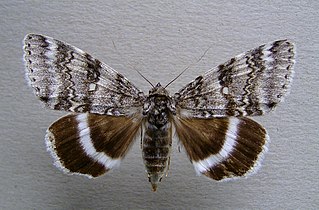
Catocala relicta, the white underwing or relict, is a moth of the family Erebidae. The species was first described by Francis Walker in 1858. It lives in southern Canada, from Newfoundland to Vancouver Island, south to Missouri, and Arizona.
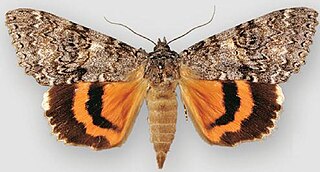
Catocala unijuga, the once-married underwing, is a moth of the family Erebidae. The species was first described by Francis Walker in 1858. It is found in North America from Newfoundland west to south central British Columbia, south to Kentucky and Missouri in the east, Colorado and Utah in the west.
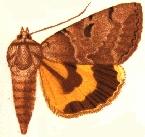
Catocala nuptialis, the married underwing, is a moth of the family Erebidae. The species was first described by Francis Walker in 1858. It is found in North America from Manitoba south through Minnesota and Nebraska to eastern Oklahoma and Texas and east to Kentucky and Illinois.

Mocis alterna, the bean looper, is a species of moth of the family Erebidae first described by Francis Walker in 1858. It is found in the Australian state of Queensland.
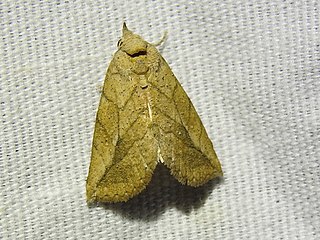
Isogona snowi or Snow's owlet, is a moth of the family Erebidae. The species was first described by John B. Smith in 1908. It is found in southern Texas and Mexico.

Isogona tenuis, the thin-lined owlet, is a moth of the family Erebidae. The species was first described by Augustus Radcliffe Grote in 1872. It is found from Ontario, Wisconsin, Ohio and New Jersey, south to Florida and Texas.
Isogona segura is a species of moth of the family Erebidae first described by William Barnes in 1907. It is found in the US state of Arizona.
Trichoplusia lectula is a moth of the family Noctuidae first described by Francis Walker in 1858. It is found throughout Asia, including the Indian subregion, Sri Lanka, Thailand, Borneo, Java, Japan, as well as Western Australia and Queensland.
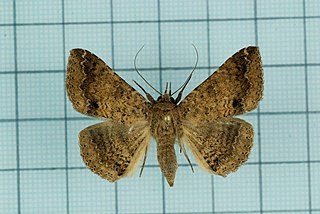
Ericeia pertendens is a moth in the family Erebidae first described by Francis Walker in 1858. It is found from the Indo-Australian tropics to the Solomon Islands.
Eulepidotis addens is a moth of the family Erebidae first described by Francis Walker in 1858. It is found in Saint Kitts, Montserrat, Dominica, Saint Lucia, Saint Vincent, Jamaica, Hispaniola, Puerto Rico, Mexico, Guatemala, Venezuela and Brazil. It was reported from Texas by Ed Knudson and Charles Bordelon in 2004.

The Boletobiinae are a subfamily of moths in the family Erebidae, containing about 956 species. The taxon was described by Achille Guenée in 1858.
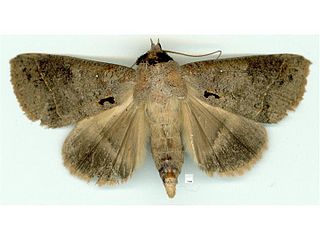
Pantydia metaspila is a species of moth of the family Erebidae first described by Francis Walker in 1858. It is found in China, Japan (Ryukyus), India (Maharashtra), Thailand, Taiwan, the Maledives, Sri Lanka, the Philippines, Borneo, Sumatra, Sulawesi, the Tanimbar Islands, Seram, Papua New Guinea, the Caroline Islands, the Solomon Islands, Vanuatu, Fiji, as well as Australia, where it has been recorded from Queensland.
















